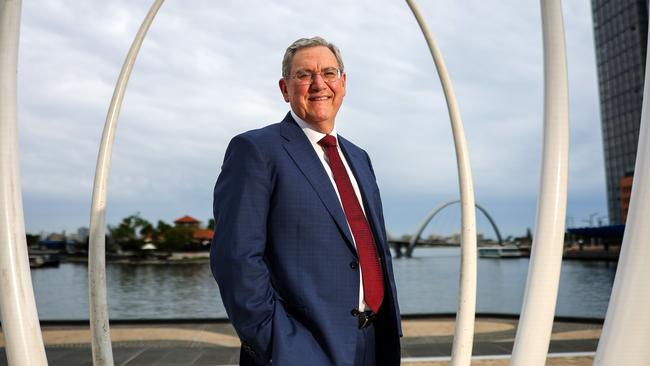Super funds the poster child for what goes wrong when governance fails, says ASIC boss
ASIC chair Joe Longo has launched a major broadside at leaders of the superannuation industry that should send shockwaves across the sector.

Business
Don't miss out on the headlines from Business. Followed categories will be added to My News.
ASIC chair Joe Longo has launched a major broadside at leaders of the superannuation industry that should send shockwaves across the sector, going far beyond its action against industry giant AustralianSuper.
In blunt statements in a speech to the Australian Institute of Company Directors on Wednesday, after the announcement of action against AustralianSuper for delays in paying out death benefits to 7000 claimants over a five-year period, Longo accused the super fund sector of becoming a “poster child for what can and does go wrong when governance fails”.
In a scathing criticism, he hit out at some super fund leaders for not having a “grip” on what goes on in their funds and being “surprised” at the high level of member complaints against them, accusing them of being disconnected from what is really going on in their businesses.
It signals ASIC has its sights set on the broader industry for what it sees as persistently poor customer service, indicating that there is more action to come against other funds.
Its current focus is on delays in payment of death benefit claims in the super sector – but the question is how much of this is an indication of a lack of investment in broader levels of customer service as an ageing population now seeks to draw down some of its hard-earned savings.
The Association of Superannuation Funds of Australia has hit back at Longo’s comments, declaring that “Australia’s phenomenally successful super system is the envy of the world”.
ASFA argues that the typical balanced super fund returned 10.5 per cent to members last year, with some funds returning up to 12 per cent, a result that has come about as a result of “prudent investment and management”.
“These kinds of returns would simply not be possible if the boards overseeing the governance of super funds didn’t know their business extremely well,” it said.
The ASFA said calling super funds “the poster child for what can and does go wrong when governance fails,” was “not constructive” and a “confusing overreach which risked undermining faith in the sector”.
The super fund sector has had a strong focus on investment returns, but the real question is whether the administrative side of the funds has kept pace with the demands of millions of members now retiring or heading towards retirement.
Cost is a factor in the net returns to members and while investment performance has been strong, the question is whether funds have been keeping costs down by underinvesting in internal systems needed to give their members the same level of service as they get from their banks.
In a broader sense, Longo’s comments are a wake up call for the sector: that the easy days of rapid growth on the back of mandated superannuation payments, set to rise to 12 per cent in July, are over, with funds now having to focus on a lot more than just their investment returns.
Longo’s tough attitude also signals the end of the claims by the $1.4 trillion industry fund sector about the inherent virtues of their low-cost model, with funds now on notice that they will have to make significant investments in upgrading their administrative systems and improving customer service.
ASIC is watching the increasing complaints against super funds now being lodged with the Australian Financial Complaints Authority closely. It is working on a report expected to be released in early April about the 10 worst super funds in handling death benefit claims. AustralianSuper is the largest super fund in the country so more complaints against it could be expected. But it scored by far the highest on the list of complaints in the 2023-24 financial year lodged with AFCA – 1549 complaints lodged against it as against 568 lodged against the Australian Retirement Trust, which is only slightly smaller.
It was followed by 493 against the Cbus trustee, 415 against Mercer, 349 against Aware and 323 against Hostplus.
Interestingly, by far the largest area of complaints against AustralianSuper is account administration, with the number of complaints over death benefit payments much smaller.
To be fair to AustralianSuper, it recognised the problems some time ago, undertaking a $120m investment in service improvements, including bringing more of its operations in-house which, it says, “require high care and empathy”.
It set up an in-house bereavement centre in 2024 with 75 dedicated case managers who handle death claims from start to finish.
The fund argues that the spike in complaints has been largely due to an increase in deaths and significant problems with staffing during the Covid pandemic, creating backlogs in processing.
Other larger funds have taken a different approach to handling member administration and insurance claims. ART has long handled its administration in-house, which is one of reasons for a lower level of complaints across the board.
Aware Super undertook a major program to bring its members into a new cloud-based system in a three-year process to bring its administration in house, ending a longstanding arrangement with Mercer.
ASIC’s move on AustralianSuper is the latest in a string of actions against super funds including fining Aware Super $20m for charging fees for no service, Westpac/BT $20m for incorrectly charging insurance commissions to members, Colonial First State $20m for misleading members, and action against construction industry fund Cbus last year for delays in handling death benefit claims.
In its most recent action AustralianSuper was fined $27m for failing to merge super accounts – the second-highest penalty for a super fund in the last five years.
Problems in the internal systems of super funds were highlighted by super industry think tank, The Conexus Institute, in a paper released in January.
It cited “underdeveloped operational infrastructure” as a major concern in its review.
“Failures in member servicing – as highlighted by regulators and media – stand as an indication that something is not quite right somewhere in the system,” the report says. “We suspect this may reflect issues with the systems, processing and staffing on the operational side, particularly in relation to member administration.
“The likely root cause is that super is transitioning quickly from something of a cottage industry into a major financial sector but is struggling with legacy systems and processes.”
It says “there is a need for both the authorities and super funds boards to get to the heart of the matter and identify required actions”.
Meanwhile APRA has also been moving to raise the standard of super fund trustees, arguing that the funds these days are so large they need a new generation of much more skilled trustees.
Some industry funds have boards of well meaning representatives from the employer and the union movement who lack direct expertise in financial management.
Recent announcements from APRA about proposed new governance standards for super funds, including raising minimum standards for directors, requiring consultation with APRA over potential appointments and setting a lifetime tenure of 10 years for non-executive directors, have raised the ire of the ACTU.
It has criticised APRA for “straying far beyond its purpose as a regulator”, with the proposals, seeking to “all but run” the funds.
It criticised the proposals as involving “an unprecedented character assessment of potential directors which is not present across other corporate director requirements”.
The super fund sector has been congratulating itself on its success for a long time, but the fact is that it is going to have to spend up to invest in member services.
This will accelerate pressure for more consolidation in the sector as well as increasing cost levels on what were once low cost industry funds.
Longo has the sector in his sights and there is a lot more pressure to come as he puts the focus on member service.
Originally published as Super funds the poster child for what goes wrong when governance fails, says ASIC boss



